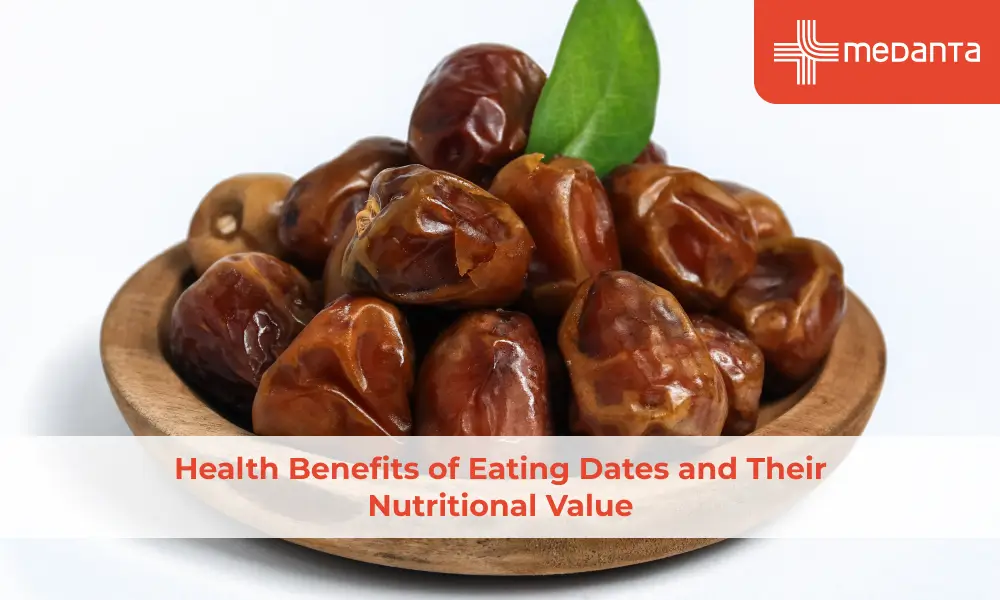Health Benefits of Dates and Their Nutritional Value

TABLE OF CONTENTS
Nature doesn't make many foods as complete as dates. They are loaded with fibre and essential nutrients. You'll be amazed at how many minerals and vitamins are packed into such a small fruit.
These fruits give you 15% of your daily potassium needs, 13-14% of magnesium, and a whopping 40% of copper. The vitamin B6 levels in dates are noteworthy. Dates contain strong antioxidants such as flavonoids, carotenoids, and phenolic acids that shield your cells from damaging free radicals.
These natural elements contribute to the fresh dates benefits and overall health benefits of dates. This article explains to you how consuming these remarkable fruits can improve your health in a natural way.
Nutritional Value of Dates
The humble date fruit packs an impressive nutritional punch that sets it apart from other dried fruits. A typical 100g serving of dates provides 277-314 calories. These calories come from natural sugars like glucose and fructose.
Dates pack a rich blend of essential minerals and antioxidants. They contain:
75g carbohydrates with 7g fibre
2g protein and minimal fat
15% of daily potassium requirements
40% of daily copper needs
13% of the daily magnesium value
The most important amounts of B vitamins, especially B6
Powerful antioxidants including flavonoids, carotenoids and phenolic acid
Dates have a relatively low glycemic index. This makes them a better choice than many processed sweets despite their high sugar content.
How Many Dates to Eat Per Day?

Nutrition experts suggest eating 2-3 dates daily. This helps you enjoy their health benefits without consuming too many calories. This small portion—about 40g—gives you 120 calories.
Watching your portion size is key as dates pack a lot of calories. People who watch their blood sugar levels or manage their weight should only eat the recommended amount.
10 Health Benefits of Eating Dates
Here are the amazing advantages that make dates a top choice for your well-being:
Supports Digestive Health: Dates contain dietary fibre (7 grams per 100g serving) that helps regular bowel movements. Research shows that people who ate dates daily had substantially better stool frequency. The fibre also feeds good gut bacteria and improves digestion.
Provides Antioxidants: Dates have the highest antioxidant content compared to other fruits. These fruits contain powerful compounds like flavonoids, carotenoids and phenolic acid that protect your cells from harmful free radicals and reduce disease risk.
Boosts Brain Health: Your brain functions better when you keep taking dates, especially if you're elderly. Research reveals that dates reduce inflammatory cytokines in the brain. This could lower your risk of brain disorders like Alzheimer's.
Boosts Energy: Natural sugars in dates (glucose, fructose and sucrose) give you quick energy. The fibre slows down sugar absorption, which gives you steady energy without the crashes you get from processed sugar.
Promotes Heart Health: Dates can lower total cholesterol and triglycerides while boosting good HDL. Their potassium content helps control blood pressure, making them great for your heart's health.
Helps Regulate Blood Sugar: These sweet fruits have a low glycemic index, so they don't cause big blood sugar spikes. Their fibre slows digestion and helps control blood sugar levels.
Natural Sweetener: Dates are rich in sweetness so you can use them instead of refined sugar. Blend them into a paste and use it to replace white sugar.
Improves Bone Health: Dates are rich in selenium, manganese, copper, and magnesium. These minerals help keep your bones strong. These minerals also prevent conditions such as osteoporosis by supporting bone health.
Diabetes Management: People with diabetes can safely eat 1-2 dates according to multiple studies. According to the study patients with type 2 diabetes mellitus showed substantial decreases in LDL cholesterol when they ate dates daily.
Reduces Inflammation: Polyphenols in dates work as powerful anti-inflammatory agents. They suppress inflammatory markers & change immune responses, which might lower your risk of chronic diseases.
Conclusion
Dates are a remarkable addition to any diet. These sweet treats do more than taste delicious - they deliver an impressive nutritional punch. A mix of essential vitamins, minerals, fibre, and natural sugars makes them a perfect snack if you have health in mind.
Many people see dates as just another dried fruit, but their health perks paint a different picture. These tiny powerhouses support your digestive system, boost brain function and improve bone & overall health. Keep in mind that moderation is key. Consuming 2-3 dates daily gives you plenty of health benefits without adding too many calories.
FAQs
What are the health benefits of eating dates?
Dates provide many health advantages. They improve digestive health through fibre content and reduce inflammation with antioxidants. These fruits boost brain function, help maintain heart health by regulating blood pressure, and keep blood sugar levels stable. These also make bones stronger and give natural energy boosts.
What is the nutritional value of dates?
A 100g serving of dates contains:
277-314 calories
75g carbohydrates (mainly natural sugars)
7g fibre
2g protein
Minimal fat
Essential nutrients like potassium, iron, magnesium, and vitamin B6.
How many dates should you eat per day?
Doctors recommend consuming 2-3 dates each day. This quantity provides an ideal mix of benefits without adding excess calories to your diet. You'll get fibre, nutrients and natural energy while avoiding overconsumption.
Are dates good for men's health?
Yes. These fruits have an impact on sperm quality and fertility. Their antioxidants play a role in protecting sperm cells from harm. The vitamins B6 and magnesium found in dates help to boost sperm production and motility.
What are the benefits of dates for women?
Women can benefit from dates in several ways. They support pregnancy, make labour easier and strengthen bones. The iron content helps reduce hair loss. Vitamins C and D improve skin elasticity, and dates help with weight management.
Do dates help in digestion and weight management?
In fact, they do! The high fibre content helps regular bowel movements and feeds good gut bacteria. Dates make you feel full, which prevents overeating. They also help lower blood sugar levels and manage weight.
Which vitamins and minerals are present in dates?
Dates contain:
Potassium to support heart function
Magnesium for muscle and nerve function
Copper for enzyme function
Vitamin B6 for nerve functioning
Iron for blood health
Calcium for bones
Can dates improve energy levels?
They sure can! Natural sugars (glucose, fructose) in dates provide quick energy without crashes. The fibre slows sugar absorption to give you sustained energy. These qualities make dates perfect before workouts.
Are dates safe for diabetics?
Dates have a low glycemic index, which makes them suitable for diabetics in moderation. Research shows they don't cause significant blood sugar spikes. Just stick to 2-3 dates and eat them with protein sources.
How should dates be stored for freshness?
Keep dates in airtight containers to stay fresh. Putting them in the fridge extends their life to 6-12 months, while freezing keeps them good for up to 3 years. Room temperature works for short-term storage but might dry them slightly.






